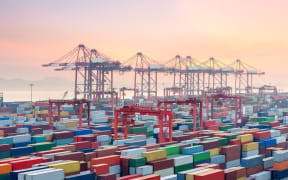
DHL has been examining its data on trade, travel and connectivity trends. Photo: RNZ / Cole Eastham-Farrelly
New Zealand has slipped down the ranks of globally connected countries in the world, hit by a drop in trade and international passenger traffic.
Global logistics company DHL has been sifting through its data on trade, travel, and connectivity trends and New Zealand has fallen 13 places to 43rd out of the 181 countries in 2022, with Singapore maintaining the top spot.
The survey showed New Zealand's inflow of investment capital and information connectivity improved, but that was offset by weaker flows of people and trade, which appeared to be a hangover from the Covid-19 lockdowns.
"Prior to the pandemic, international travel had been on a strong upward trajectory, with the number of people visiting foreign countries for both leisure and business purposes reaching more than five times its 1980 level by 2019," the report said.
"The Covid-19 pandemic abruptly reversed this trend, causing the number of people travelling to foreign countries to plunge to a level last seen three decades ago."
But with the pandemic over, the report found there had been little change in how goods and services, people, capital, and information were moving around the world in 2023 from record high activity in 2022.
It says the world was not looking inward despite an increase in conflicts and war, as well as ongoing trade disputes between some of the world's largest economies.
"Through 2023, there is no robust evidence of international flows generally becoming more regional," the report says.
"Research has established firmly that trade was stretching out over longer distances, not regionalising."
However, it says a shift to regionalisation was still on the cards, as many companies and governments were working to foster regional supply chains, which could take several years yet to execute.
In any case, it says the world was less globalised than many presume, with substantial potential for additional growth.
"This shrinks the scope for deglobalisation and makes it more costly."




